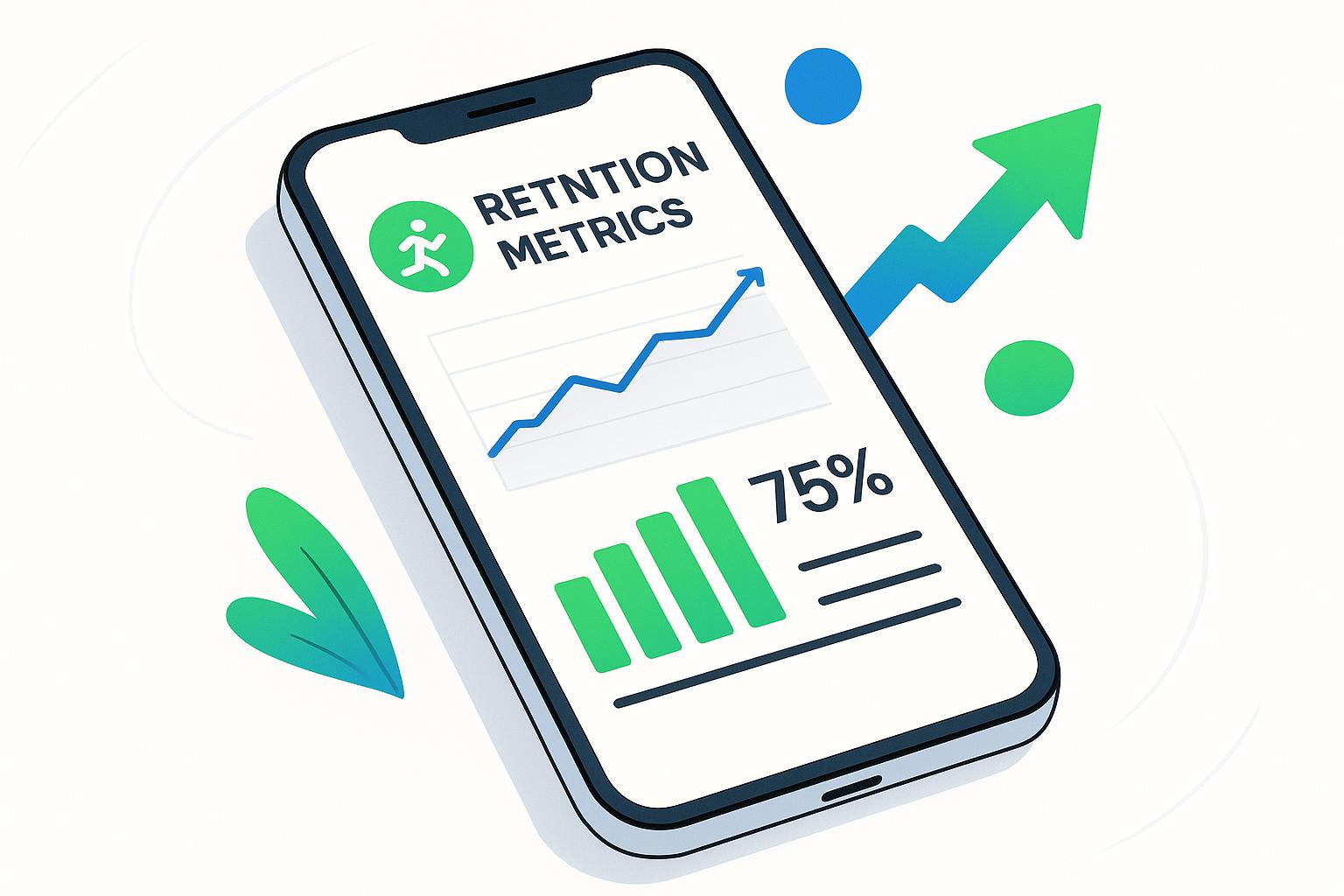Fraud can devastate startups with tight budgets and limited resources. Here’s a quick guide to the top 5 anti-fraud tools that can help protect your business:
- Socure: Combines AI-powered identity verification, risk assessment, and compliance tools to reduce false positives by 30% and improve accuracy by 20%. It simplifies compliance with KYC and AML regulations.
- Seon: Offers real-time fraud detection with AI models for automation and transparency. Reduces eCommerce fraud by 96% and cuts fraudulent registrations by 90%.
- Unit21: A no-code platform with AI tools for fraud detection and compliance. Reduces manual investigation time by 80% and automates regulatory filings.
- Veriff: Specializes in identity verification with AI analyzing facial features and documents. Supports global compliance and reduces identity theft for cross-border startups.
- Lucid Financials: Integrates fraud detection with financial planning. Uses AI to detect financial crimes and automates compliance tasks. Affordable pricing starts at $45/year.
Quick Comparison
| Tool | Detection Accuracy | AI Features | Compliance Support | Integration Options | Starting Price |
|---|---|---|---|---|---|
| Socure | High | Machine learning for identity | KYC, AML | REST APIs, SDK integration | Custom pricing |
| Seon | High | Blackbox & whitebox models | GDPR, PSD2 | API integration, webhooks | $599/month |
| Unit21 | High | No-code ML tools | AML, sanctions screening | REST APIs, batch processing | Custom pricing |
| Veriff | High | Facial recognition AI | KYC, AML, global | API, mobile SDKs | $0.80/verification |
| Lucid Financials | Moderate | Gen AI, smart search | SOC 2, PCI, ISO 27001 | QuickBooks, banking APIs | $45/year |
Protecting your startup from fraud is not just about avoiding losses - it’s about building trust and ensuring compliance. Choose a tool that aligns with your needs and budget to safeguard your business and customers.
Fintech Fraud Prevention: Tips & Best Practices from Leading Experts & Operators
1. Socure
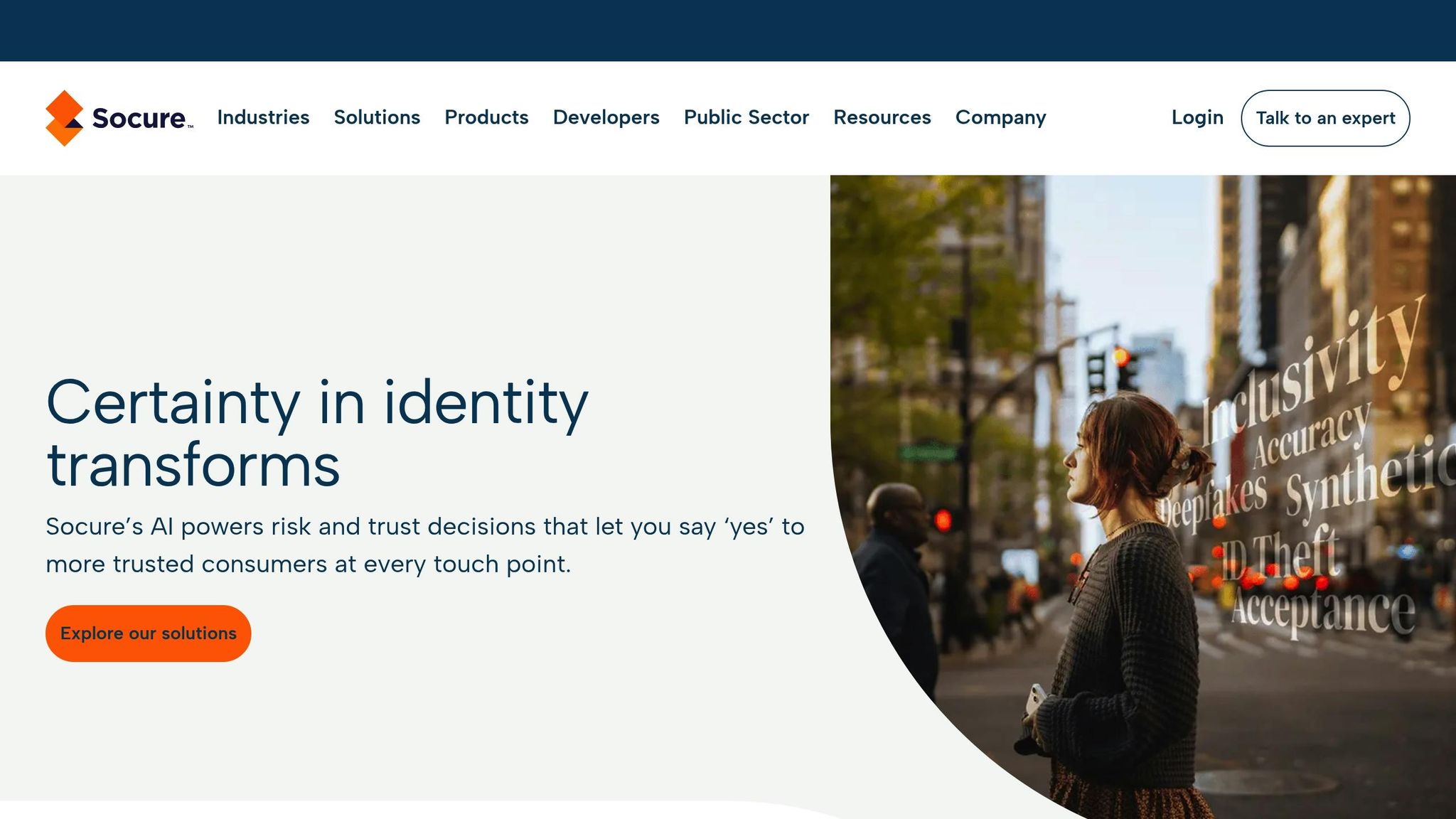
Socure delivers a powerful suite of fraud prevention tools that combine identity verification, risk assessment, and compliance features. Its RiskOS platform brings together watchlist screening, digital intelligence, and identity verification, making it an excellent choice for startups seeking comprehensive fraud prevention. The platform's AI-driven risk assessments reduce false positives by 30% and improve accuracy by 20%, while also cutting manual review times by 75%. Additionally, Socure's Sigma Identity Fraud solution uses AI to detect identity manipulation with nearly six times the accuracy of conventional methods. This robust system helps startups meet strict U.S. financial regulations with ease.
Compliance with Financial Regulations
For startups navigating the complexities of U.S. financial regulations, Socure provides automated solutions to simplify compliance with Customer Identification Program (CIP) and Know Your Customer (KYC) requirements. These solutions align with the USA PATRIOT Act, Bank Secrecy Act, and similar standards. Its Global Watchlist Screening with Monitoring further helps prevent money laundering and terrorist financing through a two-stage risk scoring system. Socure Verify also shines with a 99% verification success rate for mainstream populations and 95% for Gen Z, ensuring thorough customer verification.
"Socure really understands the needs of sponsor banks, makes it easy, and gives us the transparency we never had before."
- BSA Officer, Top U.S. sponsor bank
Real-Time Monitoring and Alerts
Socure's Sigma First-Party Fraud solution offers continuous risk monitoring across the customer lifecycle, sending instant alerts when risk profiles change. This proactive system allows startups to act quickly, preventing fraud before it escalates. A key feature is the First-Party Fraud Consortium, which, as of December 2024, includes five of the top 10 U.S. financial institutions. The consortium pools intelligence from 190 million contributed identities (121 million unique), 325 million accounts, and 20 billion transactions, enabling rapid analysis and decision-making.
"With the launch of the Identity Manipulation Risk Score, we're giving organizations the ability to proactively assess risk before financial losses occur, using AI-powered predictive analytics that stop bad actors in their tracks."
- Ori Snir, Head of Product Management, Fraud and Identity Solutions at Socure
Integration with Financial Systems
Socure doesn't just tackle fraud - it also integrates seamlessly with financial systems. The RiskOS™ platform connects with existing contact center dashboards and financial systems, giving customer service teams real-time access to authentication results. Currently, the platform supports 90% of the sponsor bank market and is trusted by more than 500 fintech companies. For example, Capital One improved fraud detection accuracy while minimizing customer inconvenience, and Betterment enhanced its ability to identify identity theft while reducing manual account reviews.
2. Seon
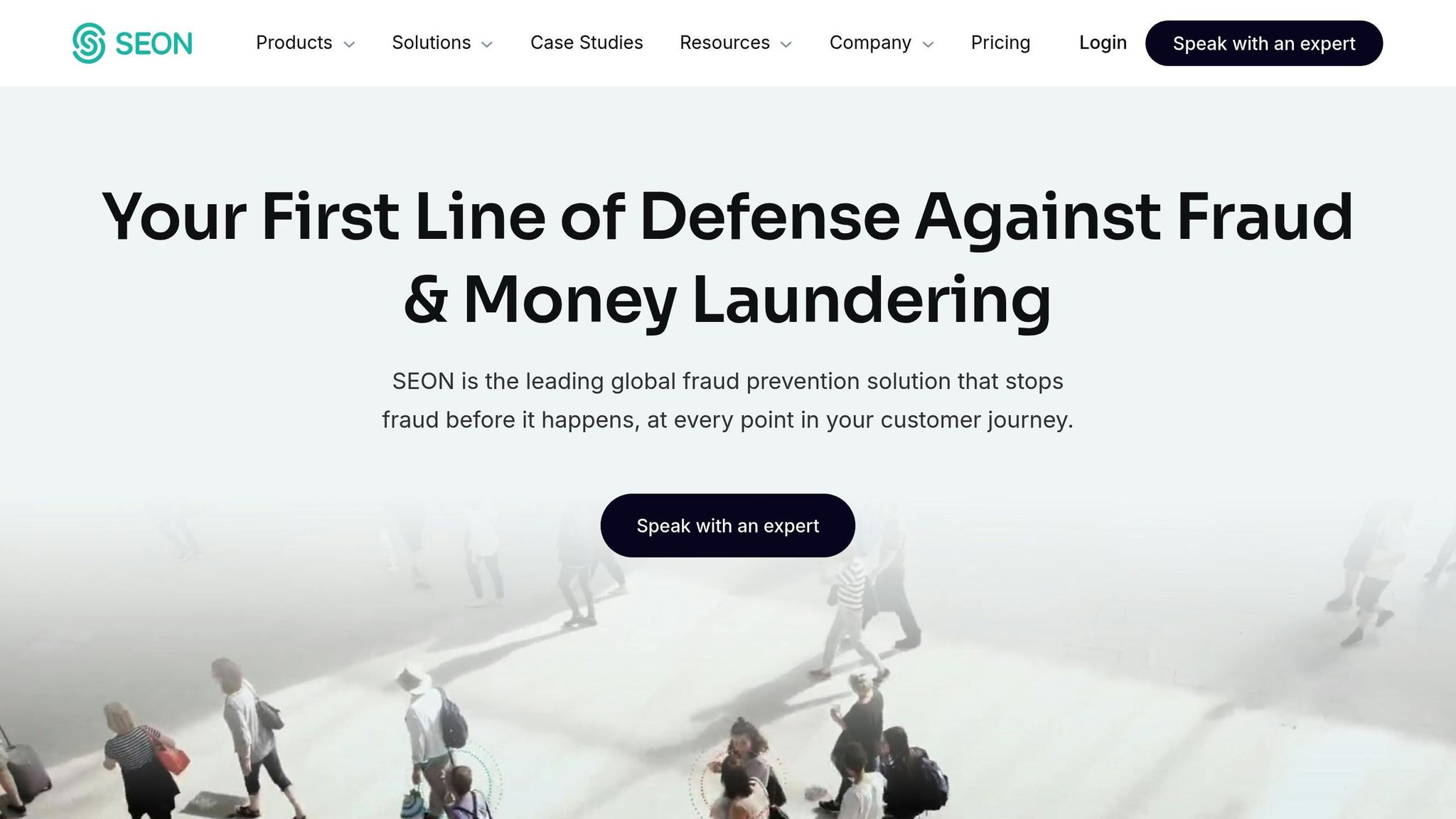
Seon offers a dual AI approach, combining blackbox models for automated decisions and whitebox models for complete transparency. This setup allows startups to strike a balance between operational speed and regulatory compliance, tailoring the solution to their unique needs.
AI-Powered Fraud Detection
Seon’s engine boasts impressive results: a 96% success rate in reducing eCommerce fraud, automation of 95% of fraud checks, and a 90% reduction in fraudulent registrations. The platform employs both simple heuristic rules and complex multi-parameter rules, giving startups the flexibility to address various fraud scenarios. A sandbox environment is also available to test new rules safely before going live.
The blackbox models are designed to adapt in real time to evolving threats, ensuring automated responses to new challenges. Meanwhile, the whitebox models provide clarity by explaining why specific transactions are flagged, making it easier for businesses to understand and refine their fraud prevention strategies.
"We saw an immediate 25% drop in fraudulent transactions and when we layered on machine learning, we increased the accuracy of detecting fraud by an additional 15%."
- Lucrecia Vera, Partner, Solventa
Compliance with Financial Regulations
Navigating U.S. financial regulations can be daunting for startups, but Seon simplifies this with its robust AML (Anti-Money Laundering) screening capabilities. The platform checks new customers against multiple watchlists, including PEP, RCA, the FBI's Criminal and Fugitive lists, and various sanctions lists. This ensures potential risks are flagged early.
Seon’s 360-degree customer analysis dives into digital footprints to help identify potential money laundering activities. It also monitors transactions in real time, sending alerts for any suspicious behavior. By conducting initial checks before full verification, Seon reduces KYC costs while keeping startups ahead of compliance demands.
Real-Time Monitoring and Alerts
Seon continuously tracks user behavior and transaction trends, instantly flagging suspicious activities. This reduces manual review times by 90%. Its AML suite minimizes false positives, improving detection accuracy while ensuring legitimate transactions aren’t unnecessarily flagged. The system can send immediate alerts for transactions that exceed set thresholds, allowing businesses to act quickly.
"SEON significantly enhanced our fraud prevention efficiency, freeing up time and resources for better policies, procedures and rules."
- Chief Compliance Officer, Soft2Bet
Integration with Financial Systems
Seon’s APIs are designed for fast and seamless integration. For example, NOTYD reported completing their setup in just five days. Businesses can incorporate Seon’s tools individually or as part of a broader risk management strategy. Case in point: Barion reduced review times from 10 minutes to just 60 seconds, achieving an 87% drop in fraud and an 8× ROI.
"We were looking at another provider, but they came back to us with a 4-6 months integration window. With SEON, it was literally a phone call, sandbox tests on Monday and by the end of the week, it was done."
- Coert Snyman, Senior Analyst, NOTYD
Seon’s platform integrates seamlessly with existing systems, leveraging proprietary data to inform decision-making at every transaction. Startups can implement the solution through APIs or via the AWS Marketplace, offering flexibility to fit their tech stack. With its data-driven approach, Seon sets a high standard as a comprehensive fraud prevention and compliance tool.
3. Unit21
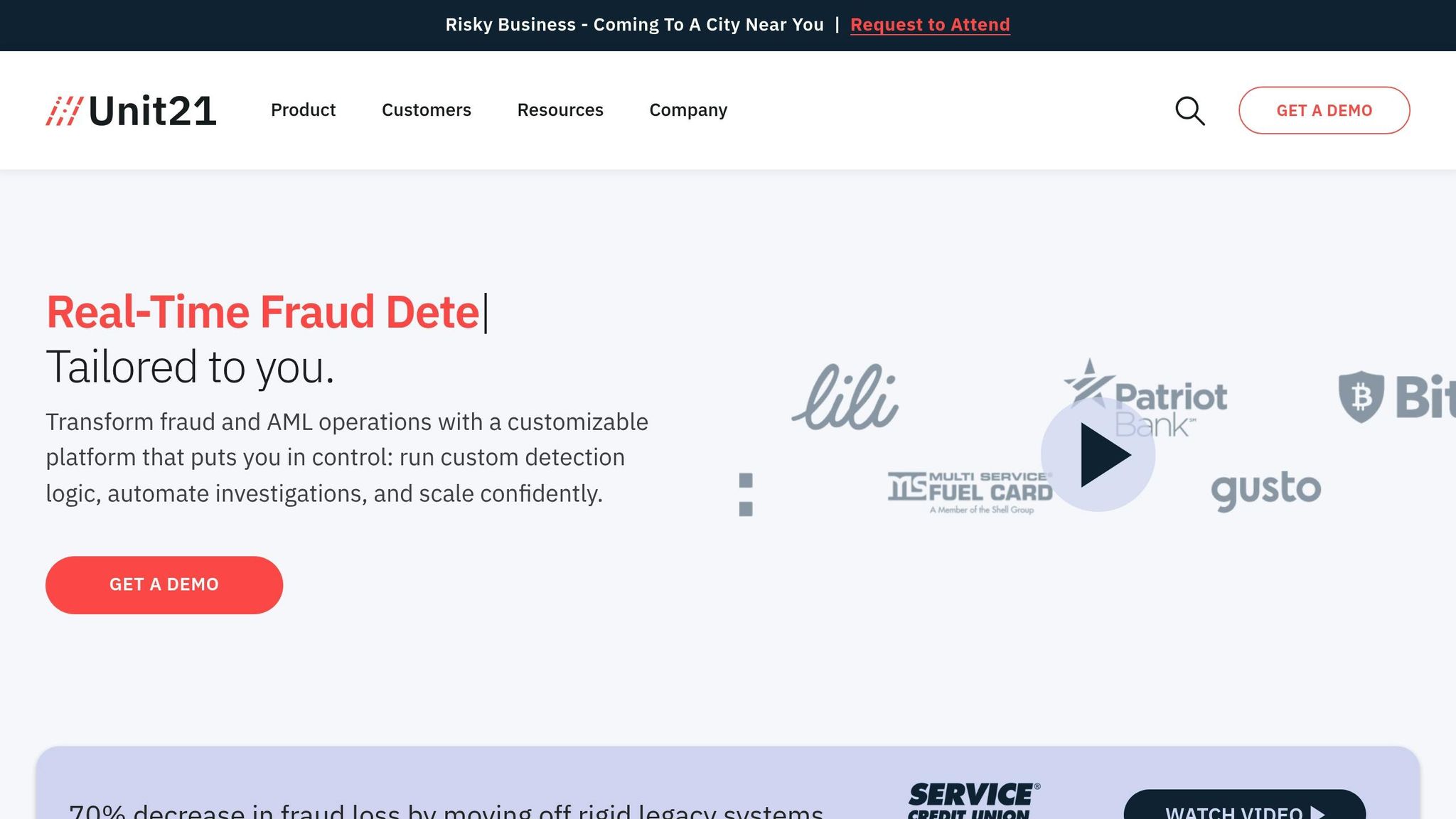
Unit21 offers a no-code platform that allows startups to tackle fraud threats while ensuring compliance with financial regulations. By combining real-time fraud detection with automated compliance tools, the platform simplifies complex processes, helping startups stay ahead of potential risks. Key features like the AI Agent and AI Copilot streamline investigations while maintaining the level of transparency required for regulatory oversight.
AI-Powered Fraud Detection
Unit21's AI tools do more than just spot patterns - they actively evaluate the legitimacy of transactions. The AI Agent can reduce manual investigation time by up to 80%, letting fraud teams dedicate their efforts to more intricate cases while routine tasks are handled automatically.
The platform also includes the Ask Your Data feature, which lets teams query fraud data using natural language. This makes it easier for non-technical staff to uncover insights without needing specialized skills. At the same time, the AI Copilot drafts alert narratives, saving analysts countless hours of documentation work.
"Fraud and AML teams are often bogged down by the sheer volume of data and manual processes. With Ask Your Data and AI Copilot, we are empowering teams with more control over their data, enabling them to respond more effectively to threats."
- Trisha Kothari, Unit21 CEO
Unit21's AI prioritizes the most critical cases, ensuring immediate attention to high-risk threats. This is particularly important given the increasing role of AI in fraud tactics - 40% of transactions blocked for scams in 2024 were flagged due to AI-driven methods. Additionally, the FBI reported a 23% rise in fraud cases that same year.
Beyond detection, Unit21 also automates compliance workflows, making it easier for startups to navigate regulatory requirements.
Compliance with Financial Regulations
Navigating financial compliance can be daunting, but Unit21 simplifies the process by automating key tasks like regulatory filings and audit-ready documentation for CTRs, SARs, STRs, 314(a), and watchlist checks.
The platform has already demonstrated its effectiveness, facilitating over 80,000 SAR filings totaling $70 billion. For startups, this automated approach can reduce fraud losses by 70%, all while ensuring they meet regulatory standards.
Unit21 ensures that every AI-driven decision is traceable and ready for audits, seamlessly integrating compliance with fraud response measures.
Real-Time Monitoring and Alerts
Unit21’s real-time monitoring operates within the authorization flow, enabling startups to approve or block events in under 250 milliseconds. Suspicious activities can also be flagged for manual review, giving teams flexibility. A centralized dashboard lets users adjust alerts and rules instantly as new fraud methods emerge.
"Unit21's core offering is real-time monitoring, which allows you to receive immediate responses. Clients can ingest any data into a centralized place to streamline bank fraud investigations. Analysts get immediate notifications and can block suspicious transactions before they are authorized. This allows you to visualize all your ingested user data in one place for a 360-degree view of user activities."
- Alex Faivusovich, Head of Fraud Risk, Unit21
In June 2024, Third Coast Bank showcased the platform's effectiveness by preventing $50,000 in potential check fraud. This success came after implementing Unit21’s check fraud rules and dark web monitoring, all based on just seven initial alerts. Such proactive measures not only save money but also strengthen customer trust.
Integration with Financial Systems
Unit21’s no-code platform makes it easy for startups to deploy fraud protection quickly, even without extensive technical resources. Users can create, test, and implement new rules in minutes, all while accessing historical data for deeper insights. This centralized system provides a complete 360-degree view, helping teams identify patterns that might otherwise go unnoticed if data were scattered across different systems.
As Ian Macallister, COO at Unit21, explains:
"Check fraud is a growing challenge for banks and credit unions, and the traditional detection methods are no longer sufficient".
The numbers back this up - check fraud accounted for 20% of all SAR filings in 2023, with nearly 670,000 check fraud SARs filed by financial institutions. By offering modern tools and a centralized approach, Unit21 equips startups with the protection they need to combat evolving threats effectively.
sbb-itb-17e8ec9
4. Veriff
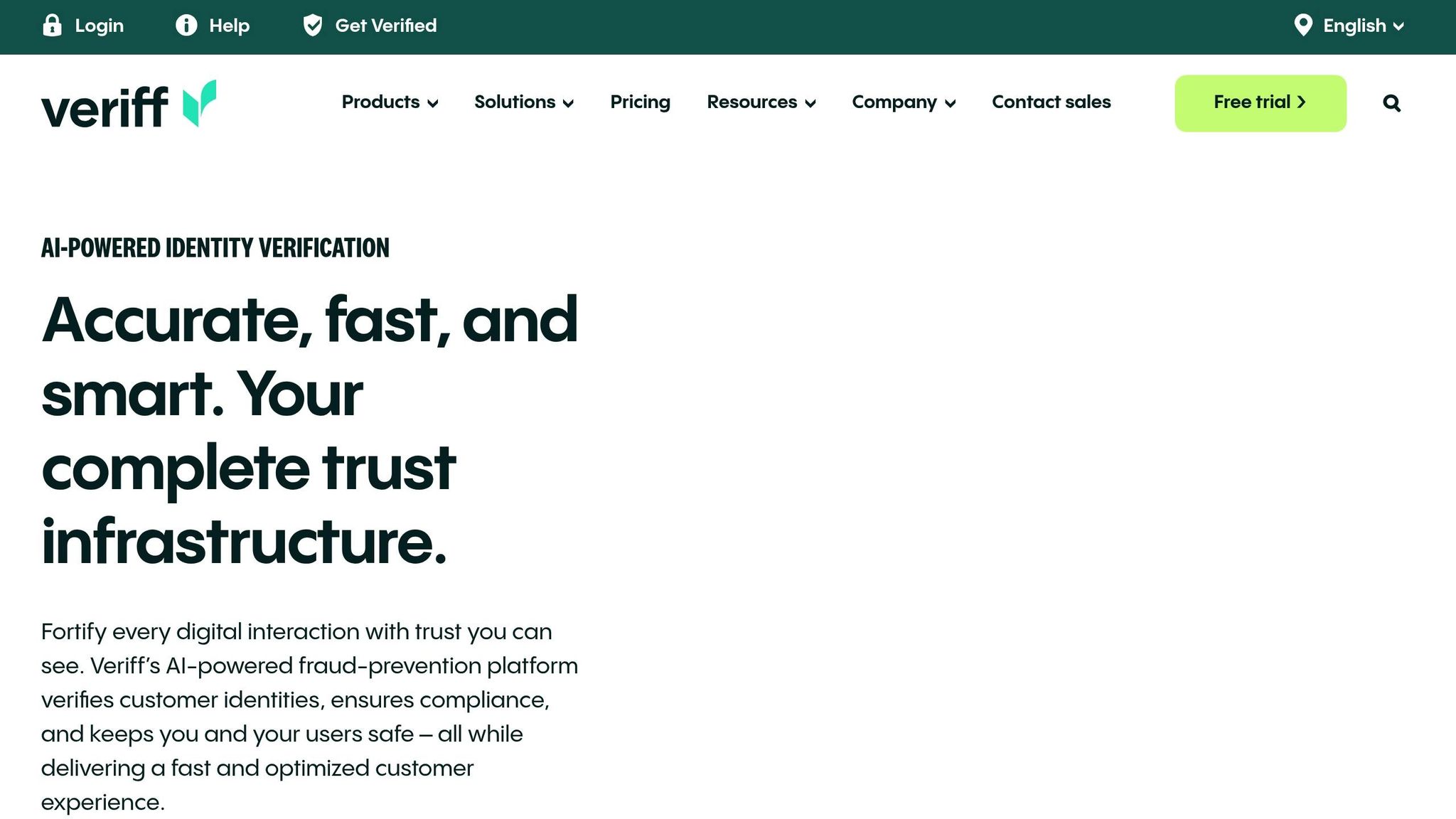
Veriff is an identity verification platform designed to help startups tackle complex fraud challenges while staying compliant with global regulations. Supporting over 12,000 government-issued IDs from 230+ countries and territories, Veriff addresses the increasing issue of cross-border fraud - a common hurdle for startups expanding internationally. Its advanced detection tools are built to handle the ever-evolving nature of fraud.
AI-Powered Fraud Detection
Veriff leverages AI to analyze thousands of data points, including selfies, documents, and videos, during each verification session. This technology detects subtle anomalies in facial features and other signals that could indicate fraud. With online fraud increasing by 21% between 2023 and 2024 and costing companies an average of 9% of their revenue, such tools are becoming essential. For startups, this is even more critical as 75% of customers evaluate a company’s fraud prevention measures before engaging with their services.
"Generative AI can identify fraudulent activities, but also create convincing counterfeit documents, which can fool traditional ID verification methods. Fraudsters are evolving faster than ever, making it critical for startups and SMBs to use advanced identity verification solutions that go beyond manual checks." - Veriff
Take, for example, a small e-commerce startup receiving a large order accompanied by an AI-generated fake ID that passes standard checks. Veriff’s AI-powered system would flag the fake by analyzing multiple data points that human reviewers might overlook.
Compliance with Financial Regulations
For startups navigating the maze of compliance across various jurisdictions, Veriff simplifies the process with automated KYC (Know Your Customer) and AML (Anti-Money Laundering) solutions. The platform ensures adherence to regulations like GDPR, GLBA, FCRA, and more by automating screenings and maintaining detailed audit trails.
Veriff's AML screening includes continuous monitoring of watchlists, adverse media, and PEP (Politically Exposed Person) profiles, which are updated daily. Sanctions lists are refreshed every 15 minutes, ensuring businesses remain up-to-date with shifting regulatory landscapes.
The platform’s effectiveness is reflected in its 75% year-over-year revenue growth in Q4 2024. Companies like Comun, a digital banking service for immigrant communities, have benefited from Veriff’s robust compliance tools.
"Before Veriff, the most common fraud Comun saw was identity theft. This has been almost completely solved by having the strong KYC system Veriff provides." - Angélique Wynants, Comun's Head of Operations
By integrating Veriff, Comun streamlined identity verification across borders, reduced fraud, and bolstered AML compliance for its underbanked customer base.
Real-Time Monitoring and Alerts
Veriff’s real-time fraud prevention system sends instant alerts when customers are flagged in newly updated watchlists, ensuring ongoing risk assessment beyond the initial onboarding phase.
The platform also monitors changes with existing customers, offering continuous oversight without requiring manual intervention. This proactive approach is particularly valuable as fraudsters increasingly use AI to create advanced schemes that bypass traditional methods.
Integration with Financial Systems
Veriff integrates easily with existing financial systems, making it a practical choice for businesses. Its KYC onboarding solution helps companies meet regulatory standards while improving conversion rates and lowering customer acquisition costs.
"Veriff's KYC onboarding solution enables you to meet regulatory compliance and onboard more genuine customers, helping to cut customer acquisition costs. With Veriff, you can also utilize optional anti-money laundering checks such as PEP and sanctions screening to make it even easier to establish and implement effective CDD measures."
Pricing starts at $0.80 per verification, with a $49 monthly commitment. Add-on features, like PEP and sanctions monitoring, cost $0.09 per verification. This transparent pricing model allows startups to scale their fraud prevention efforts as they grow, supporting their broader compliance needs.
5. Lucid Financials
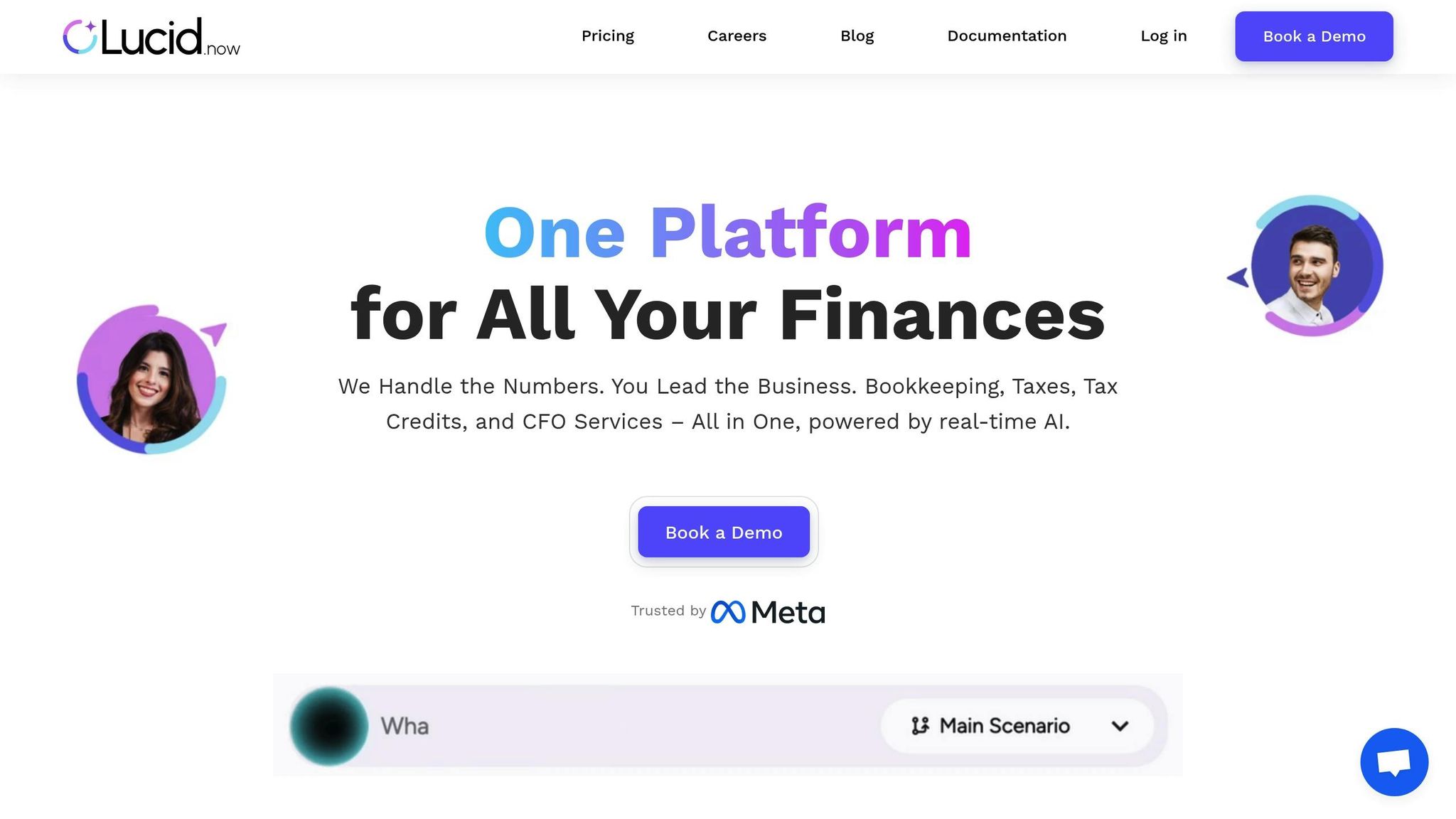
Lucid Financials goes beyond the typical fraud prevention tools by combining financial planning with powerful fraud detection capabilities. Known primarily as an AI-driven financial planning platform, it also serves as a strong defense against financial fraud. By integrating advanced AI algorithms, Lucid Financials helps businesses detect and prevent fraudulent activities across their financial operations.
AI-Powered Financial Crime Detection
Lucid Financials uses cutting-edge AI to predict risks and uncover hidden patterns within massive datasets, enabling startups to spot financial crimes before they escalate. It compiles data from various financial sources, offering a broad view of potential risks.
The platform’s use of Gen AI and smart search algorithms allows it to analyze data and identify complex relationships that traditional methods might overlook. This makes it particularly effective in detecting evolving transaction patterns, money laundering schemes, and other fraudulent activities.
"Reduce fraud losses with our effective fraud detection and prevention solution that leverages AI and data analytics." – Lucid Group
Fraudulent activity cost consumers approximately $8.8 billion in 2022, with $3.8 billion lost to investment fraud alone. Lucid Financials tackles this issue head-on, boasting a 60–99% improvement in fraud detection accuracy compared to traditional approaches.
Automated Compliance and Risk Assessment
Beyond fraud detection, Lucid Financials simplifies compliance processes. Its ACPA (Automated Compliance Process Automation) tool assesses risks related to money laundering and terrorist financing, significantly reducing the manual effort required for compliance monitoring.
The platform automates tasks like watchlist checks, minimizes false positives, and streamlines customer onboarding and due diligence. This ensures faster compliance decisions without compromising thoroughness.
Lucid Financials also screens entities against global sanctions lists - such as those from the UN, OFAC, EU, and HM Treasury. It enhances anti-money laundering (AML) efforts with AI-powered search and matching capabilities, while continuously monitoring media and risk sources using machine learning.
Real-Time Transaction Monitoring
Lucid Financials excels at real-time fraud detection by analyzing transactions to flag suspicious activity. Its advanced pattern recognition tools help distinguish legitimate transactions from potential threats.
The platform evaluates the risk of transactions, loans, or credit applications, even identifying networks of fraudsters through machine learning techniques like graph analysis. For startups in e-commerce, it safeguards against fraudulent purchases by examining customer behavior, purchase history, and device data. It also monitors blockchain transactions, spotting unusual activities such as rapid fund transfers or tracking stolen assets.
Seamless Integration and Compliance Certifications
Lucid Financials integrates effortlessly with existing financial systems via REST APIs and an intuitive dashboard. Users can access flexible search options through its portal, APIs, or batch uploads in CSV format. The platform meets key compliance standards, holding certifications like SOC 2 Type II, PCI, and ISO 27001.
As AI adoption in compliance is projected to reach 90% by 2025 for AML activities, Lucid Financials positions startups to stay ahead while maintaining regulatory compliance.
The pricing is accessible, starting with a free plan. The Starter plan costs $45 annually ($50 monthly) and includes QuickBooks integration. Professional plans, offering advanced financial models and comprehensive fraud monitoring, range from $135 to $540 annually.
Feature Comparison Table
Choosing the right tool starts with understanding how each platform stacks up. Below is a breakdown of key features across five tools, focusing on real-time detection, AI capabilities, compliance support, integration options, and pricing. This comparison offers a clear snapshot for startups looking to align their needs with the right solution.
| Tool | Real-Time Detection | AI Capabilities | Compliance Support | Integration Options | Starting Price |
|---|---|---|---|---|---|
| Socure | Advanced behavioral analytics | Machine learning identity verification | KYC, AML compliance | REST APIs, SDK integration | Custom pricing |
| Seon | Digital footprint analysis | AI-powered risk scoring | GDPR, PSD2 compliance | API integration, webhooks | $599/month |
| Unit21 | Transaction monitoring | No-code ML platform | AML, sanctions screening | REST APIs, batch processing | Custom pricing |
| Veriff | Biometric verification | Facial recognition AI | KYC, AML, global compliance | API integration, mobile SDKs | Per verification pricing |
| Lucid Financials | Pattern recognition monitoring | Gen AI with smart search | SOC 2, PCI, ISO 27001 | QuickBooks, payroll, banking APIs | $45/year (Starter) |
Key Observations
- Detection Accuracy: Traditional methods often struggle with false positives, but AI-powered tools like Seon and Unit21 show significant advancements in reducing errors and improving fraud detection accuracy.
- Compliance Support: Compliance is a cornerstone for many organizations. Tools like Lucid Financials stand out with certifications such as SOC 2, PCI, and ISO 27001, alongside automated workflows that minimize manual effort. Other platforms focus on specific regulations like GDPR, PSD2, KYC, and AML, ensuring broad regulatory coverage.
- Integration Options: Flexibility in integration is essential for seamless operations. Lucid Financials offers robust connectivity with QuickBooks, payroll systems, and banking APIs, while other tools provide REST APIs, SDKs, and webhooks for integration into existing workflows.
- Pricing Models: Pricing varies widely. Seon starts at $599 per month, catering to businesses with higher budgets, while Lucid Financials offers a more budget-friendly option at $45 annually for its Starter plan, scaling up to $540 annually for Professional plans.
Industry Trends
AI adoption is on the rise, with approximately 60% of financial institutions already using some form of AI, and 25% leveraging machine learning specifically for fraud detection. This highlights the growing reliance on AI-powered tools like these to address fraud prevention challenges effectively.
Scalability and Customization
Scalability is another critical factor. Unit21’s no-code platform enables rapid customization to meet unique business needs, while Lucid Financials combines fraud detection with financial planning, making it a versatile choice for growing startups.
This feature comparison provides a foundation for understanding how each tool can fit into a startup’s broader strategy for fraud prevention and operational efficiency.
Conclusion
Choosing the right anti-fraud tool is a critical step in safeguarding your startup's future. Fraud is a massive global issue, with organizations losing an estimated 5% of their annual revenues - amounting to $4.7 trillion worldwide. For startups operating on tight budgets, even minor fraud incidents can have devastating consequences.
Real-world examples highlight the impact of using effective tools. A major bank slashed payment fraud by 70% in just six months, while an e-commerce platform reduced fraudulent account creations by 60% within a year. These results show how the right technology can deliver measurable benefits.
Start by identifying the specific fraud risks your startup faces. Whether you need real-time transaction monitoring, identity verification, or broader financial oversight, your choice should align with your unique challenges. Pricing can vary widely, as seen in the feature comparison table - from Lucid Financials' $45-per-year starter plan to custom-priced enterprise solutions. Investing in robust fraud prevention now is far more cost-effective than dealing with the fallout of fraud later. Beyond financial protection, effective tools help maintain customer trust, ensure compliance, and build the confidence needed to attract future investors.
Look for a solution that not only meets your current needs but also scales with your growth. Startups processing high transaction volumes may require scalable platforms, while those focused on financial strategy might benefit more from integrated tools like Lucid Financials, which combines fraud detection with financial management.
The fraud prevention landscape is advancing rapidly, driven by AI-powered technologies discussed earlier in this article. With the fraud detection market expected to hit nearly $183 billion by 2030, growing at a compound annual rate of close to 23%, staying ahead of evolving threats is essential.
To make the right choice, conduct a thorough risk assessment, request demos from potential providers, and select a solution tailored to your startup's specific needs and budget. Protecting your financial assets and reputation requires a thoughtful and timely decision.
FAQs
How can AI-powered tools help startups detect and prevent fraud more effectively?
AI-powered tools are transforming how startups tackle fraud by analyzing massive amounts of data in real-time. They can spot unusual patterns and behaviors that traditional methods might overlook. Plus, these systems learn and improve as they process new data, keeping up with ever-changing fraud tactics.
By cutting down on false positives and automating the fraud detection process, these tools save both time and resources. This means startups can stay focused on growing their business while staying compliant with financial regulations and protecting their operations from potential risks.
What should startups look for in an anti-fraud tool to stay compliant with US financial regulations?
When choosing an anti-fraud tool, startups need to focus on meeting US financial regulations and look for features like transparency, traceability, and strong security protocols. It's equally essential to ensure the tool works effortlessly with your current systems, such as accounting software and banking platforms.
You should also check if the tool is tailored to your specific jurisdiction and offers regular updates to keep up with changing regulatory requirements. These considerations not only protect your business but also simplify operations and help maintain trust with your stakeholders.
How can startups seamlessly integrate anti-fraud tools with their financial systems to improve efficiency?
Startups can simplify their operations by embedding AI-driven anti-fraud tools into their financial systems using APIs and real-time data connections. This approach ensures fraud detection and prevention work seamlessly in the background, without disrupting daily activities.
With features like identity verification and transaction monitoring, these tools help automate decision-making, cut down on manual tasks, and improve precision. Beyond improving fraud defenses, this integration also supports compliance efforts and streamlines financial management, making operations more efficient overall.
